By James and Dahlia Marin, Integrative Registered Dietitian Nutritionists with more than a decade of specialized work in gut health at Married to Health. This article concludes with a link to Gut Nurture, a Complement product that James and Dahlia created containing the ingredients discussed below.
Health Starts in the Gut
Hippocrates once stated, “all disease begins in the gut.” Now more than 2,000 years later, we know that he was onto something hugely important.
Your gut microbiome plays a critical role in everything from immune support and energy levels to metabolism, hormone balance, and longevity.
And yet, even in a world with gut health supplements and cookbooks flooding store shelves, most of us have little understanding of what gut health actually is, and the simple steps we can take today to create a thriving gut microbiome to support long-term health.
In this article, we’ll take a look at the latest research on prebiotics, probiotics, and postbiotics, whether you should supplement, and how these nutrients affect your gut function.
The Importance of Gut Health (Even for People Who Eat Mostly Plants)
Your gut microbiome is a mini-ecosystem, with trillions of tiny bacteria, yeast, fungi, protozoa, and archaea, all working together. These bacteria have important functions like food digestion, the synthesis of vitamins, and the production of neurotransmitters (such as serotonin, dopamine, and GABA) that play a key role in determining your mood. The more diverse your gut ecosystem is, the more it thrives. And with a thriving gut, you also improve communication with systemic organs like your heart, liver, and brain, and help build a robust immune system to prevent and attack disease.
People who eat a plant-based (or plant-centered) diet have a huge leg up when it comes to gut health because whole plant foods are rich sources of fiber, micronutrients, and macronutrients that fuel a vibrant microbiome.
But the diversity of those foods also matters (more on that later). And depending on your health and diet history, there might be a lot more to gut health than just eating more plants.
Understanding gut health starts by understanding what feeds it — in particular, prebiotics, probiotics, and postbiotics.
Understanding Probiotics and Why Probiotic Supplements are Everywhere
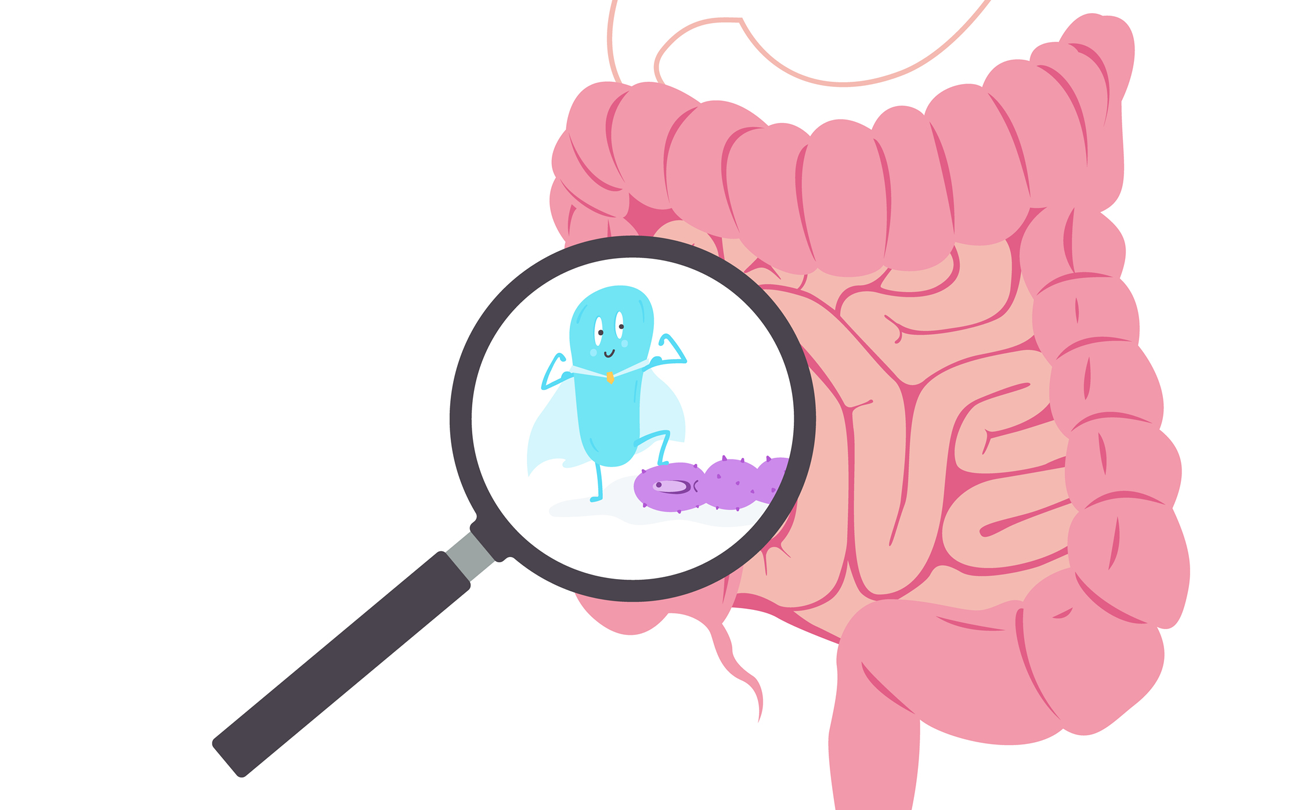
There are more than 8,000 unique bacterial strains in the human gut microbiome. Some of them are essential for everyone, others help to remedy specific conditions, and others still may actually be wreaking havoc on your body.
Some of these bacterial strains are part of what are called probiotics. And they can be a key to unlocking long-term gut health by helping create a vibrant, diverse, and well-balanced community of beneficial microorganisms.
The International Scientific Association for Probiotics and Prebiotics defines probiotics as: “live microorganisms which, when administered in adequate amounts, confer a health benefit on the host.”
These microscopic creatures are generally a good thing. They’re a natural, vital part of your gut. And you receive them in small amounts from dirt, interactions with people (and pets), the food you eat (especially fermented foods), and, quite literally, from everyday life. But they can also be added through probiotic supplements.
Should You Take a Probiotic Supplement?
Probiotic supplements have gained popularity over the past several years, and seemingly for good reason, as probiotics are the living gut bugs your microbiome depends on.
But as more research emerges surrounding the addition of probiotics through a supplement in your diet, the scientific benefits have become more uncertain.
With so many strains of unique bacteria in the gut, there’s no straightforward conclusion as to which probiotic strains are beneficial across the board.
And because we’re all genetically and metabolically unique, what works for one person may not necessarily improve another person’s gut health.
Recommended Probiotic Use: The Latest Research
The American College of Gastroenterology released an updated set of guidelines for probiotic use in 2020 and outlined a few conditions for which adding supplemental forms of additional bacterial strains are supported, including:
- Complications of inflammatory bowel disease.
- Recurrent C. difficile bacterial infection, which can be life-threatening.
- A rare condition occurring in some premature infants born earlier than 37 weeks called necrotizing enterocolitis (NEC).
Though they may seem harmless and innocuous to those using probiotics without proper guidance, unintentionally micromanaging the gut microbiome’s balance with the wrong strains can actually worsen gut issues.
How could that be? The many strains of bacteria and yeast living in the gut live in a fine balance, with some much more abundant than others. And “managing” gut health by taking probiotic supplements has the potential to throw this fine balance off.
What About Probiotic Use After Antibiotics?

Many physicians recommend taking probiotic supplements after being prescribed antibiotics, since the job of the antibiotics is to wipe out bacteria without distinguishing the “good” from the “bad.”
But it turns out that this is looking at the problem too simplistically.
It’s true that antibiotics typically remove specific strains of bacteria. But probiotics typically consist of enormous numbers of only a few types of beneficial bacteria. This can end up throwing the microbiome’s natural balance out of whack if the bacterial strains that have been destroyed by the antibiotic aren’t themselves replaced.
In fact, a 2018 study showed that those taking probiotic supplements after taking antibiotics recovered their microbiome balance the slowest when compared with those who took antibiotics without taking probiotics afterward.
That isn’t to say that all probiotic supplements are bad. The truth is just that — it’s complicated. As science continues to evolve in the area of microbiome testing, and we continue to further explore the vast world of the gut microbiome, we will continue to gain insight and clarity into proper management of the gut, and the role that appropriate gut health supplements can play.
For now, resources such as the US Probiotic Guide can provide evidence-based guidance for choosing the most appropriate probiotic strains for specific conditions.
Need a Healthier Gut? Start with Food, Not Supplements
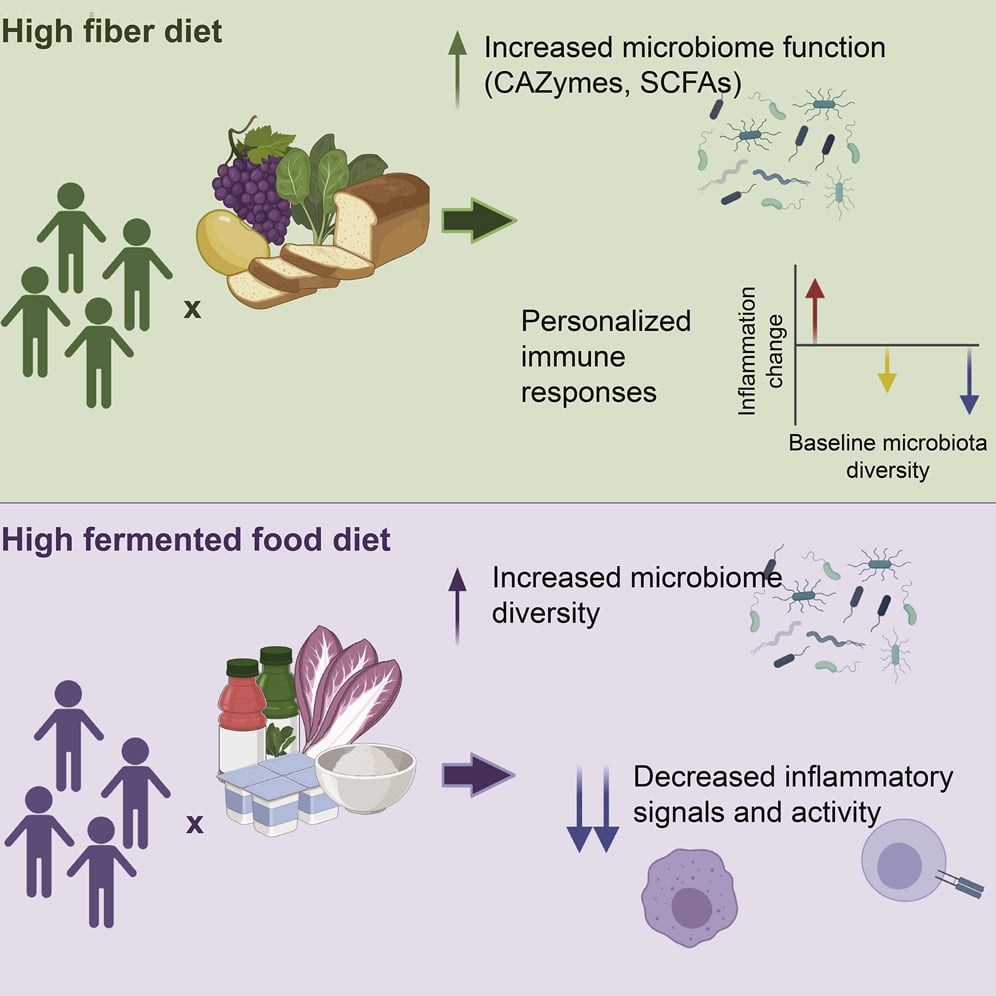
So what can you do if you actually need to take a course of antibiotics, or if you are suspicious your microbiome balance of bacteria and yeast is off?
The first step is usually to repopulate your gut bacteria with nutrient-rich fermented foods and fiber-rich foods.
A 2021 study from Stanford University showed that those consuming the most fermented and fiber-rich plant foods had a more diverse gut microbiome — and a stronger immune system, with decreased inflammatory markers — compared to those who consumed less.
Some of our favorite plant-based fermented foods include:
- Sauerkraut
- Kimchi
- Kombucha without additional sugar added post-fermentation
- Unsweetened water kefir or coconut kefir
- Miso paste (Pro tip: keep it under 200°F by avoiding direct boiling on the stove; whisk the miso with room temperature water in a separate bowl and add to freshly cooked bowls of soup or food)
- Lacto-fermented vegetables (pickled veggies fermented with added bacteria or yeast)
- Dairy-free yogurts with added bacterial and yeast strains, especially lactobacillus and bifidobacteria, two of the most abundant strains in the human colon or large intestine
- Dairy-free fermented cheeses with added active cultures
- Tempeh, raw or lightly cooked, kept under 200°F
- Unpasteurized apple cider vinegar, which contains “the mother”
(Here is FRN’s in-depth article on fermented foods.)
What About Prebiotics?
When you eat, you’re not just feeding yourself but trillions of organisms in your body — bacteria, fungi, viruses, archaea, and protozoa — through something called a prebiotic.
On average, we each have two to five pounds of bacteria in our gut microbiome. These bacteria need food, just like we do — and that’s where prebiotics come into the picture.
The word prebiotic means “life-giving,” and that’s exactly their function in your microbiome.
Prebiotics can be defined as “nondigestible food ingredients that promote the growth of beneficial microorganisms in the intestines.” In other words, they serve as food for the good gut bacteria and yeast you need to have an optimally healthy microbiome.
And here’s the key: the main prebiotics are soluble dietary fiber.
Where’s the best place to find prebiotics? Fiber-rich foods like whole plants, which we will delve into more below.
6 Critical Ways Prebiotics Impact Your Gut Health
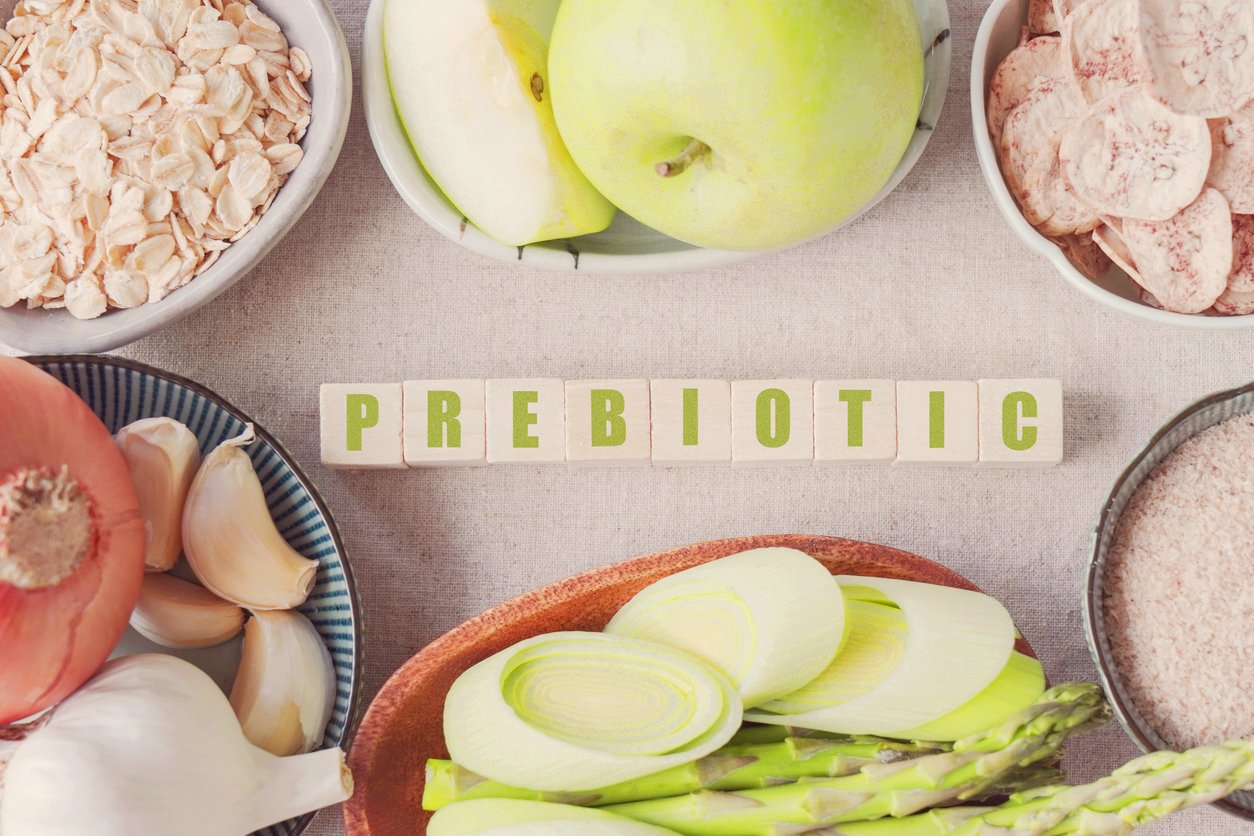
What are some benefits of prebiotics for your gut health and body as a whole?
1. Prebiotics Grow and Protect the Probiotic Bacteria Already Inside of You
You know those expensive probiotic supplements you can order online or find at the health food store? Most of those probiotic strains are probably already inside you, and you can increase their abundance with each meal.
The problem comes from not nurturing these microbial strains in your gut.
According to the latest research, prebiotic fiber is key in feeding and breeding the amazing microbes we already have inside us. As long as we keep them alive, thriving, and doing what they do best inside our bodies, we can continue reaping all of their health benefits.
2. Prebiotics Help with Nutrient Absorption
Though our bodies cannot technically absorb prebiotics, research shows they can still greatly impact how we get crucial nutrients. Thanks to prebiotics, we can absorb higher amounts of calcium, iron, potassium, B vitamins, and other nutrients. The absorption and bioavailability of these vitamins and minerals also increase in infants and the elderly (two of the most at-risk populations for lower nutrient absorption) when consuming more prebiotic-rich foods.
Studies looking at global populations have even reported a correlation between decreased fractures and osteoporosis in those who consume the most prebiotic fiber — which these studies imply could be even more important to bone health than calcium.
3. Prebiotics Help Prevent Allergies
Many allergies start in childhood. And researchers are finding that experiences in the first 1,000 days of life can have lasting effects. A number of studies are now suggesting that the cause of many allergic diseases in children can be correlated to reduced colonization of lactobacilli and bifidobacteria, two of the most important strains of bacteria in the gut. It turns out that if a baby is breastfed, these strains of bacteria are nourished by the prebiotics in breast milk known as human milk oligosaccharides. Research has shown that children who are not breastfed and not exposed to certain foods in the first few years of life can be at a higher risk of developing food allergies.
In people of all ages, it appears that a diversified diet that’s rich in prebiotic foods can decrease the symptoms of allergies.
4. Prebiotics Help with Metabolic Related Disease
Due in large part to the consumption of processed foods that are low in fiber, there is a global epidemic of what is called metabolic syndrome (a condition represented by a confluence of type 2 diabetes, high cholesterol, high triglycerides, high blood pressure, high waist circumference, and obesity), especially in more economically-developed nations.
But where we see an increase in prebiotic, fiber-rich foods, we see a decrease in both the incidence of metabolic syndrome and metabolic-related diseases.
Multiple studies have found that dietary fiber can lower cholesterol, help with gallbladder and liver health, reduce the glycemic response of food, increase satiety, and balance triglycerides, all of which are vital to preventing and reversing metabolic syndrome.
5. Prebiotics Help Your Hormones
Gut microbes produce hormones that are vital to optimal health, including estrogen, progesterone, testosterone, and more. And they need adequate nourishment (prebiotics again!) in order to fulfill this critical function in your body.
In this beneficial relationship, prebiotics help to keep the beneficial microbes happy and fed so the gut microbiome can continue creating, recycling, and balancing hormones in our bodies. Prebiotics have also been shown in studies to not only affect microbes in the gut, but in surrounding organ systems like the vagina, testes, ovaries, uterus, bladder, and the hormones they balance.
6. Prebiotics Decrease your Risk of Death
Increasing plant foods in the diet is also associated with a decrease in all-cause mortality, as seen from a meta-analysis of current prospective cohort studies.
This means that simply by eating more plants (which are by far nature’s richest sources of prebiotic fiber), you reduce your risk of death from the top five chronic disease killers, including lifestyle diseases such as cardiovascular disease, cancer, and type 2 diabetes.
That Sounds Great, But How Much Prebiotic Fiber Do You Need Daily?
The basic recommendation for overall fiber intake is 22–28 grams per day for women and 28–34 grams per day for men, according to the latest Dietary Guidelines for Americans.
This recommendation assumes that if you get the recommended amount of fiber, you’re getting all of the prebiotics you need. However, if you’re not eating a lot of whole plant foods, but instead are getting your fiber from Metamucil (a fiber supplement that provides psyllium fiber) or other fiber supplements, you won’t be getting the diversity of fiber types that your microbiome needs to function best on your behalf.
Whole Food Sources of Prebiotics
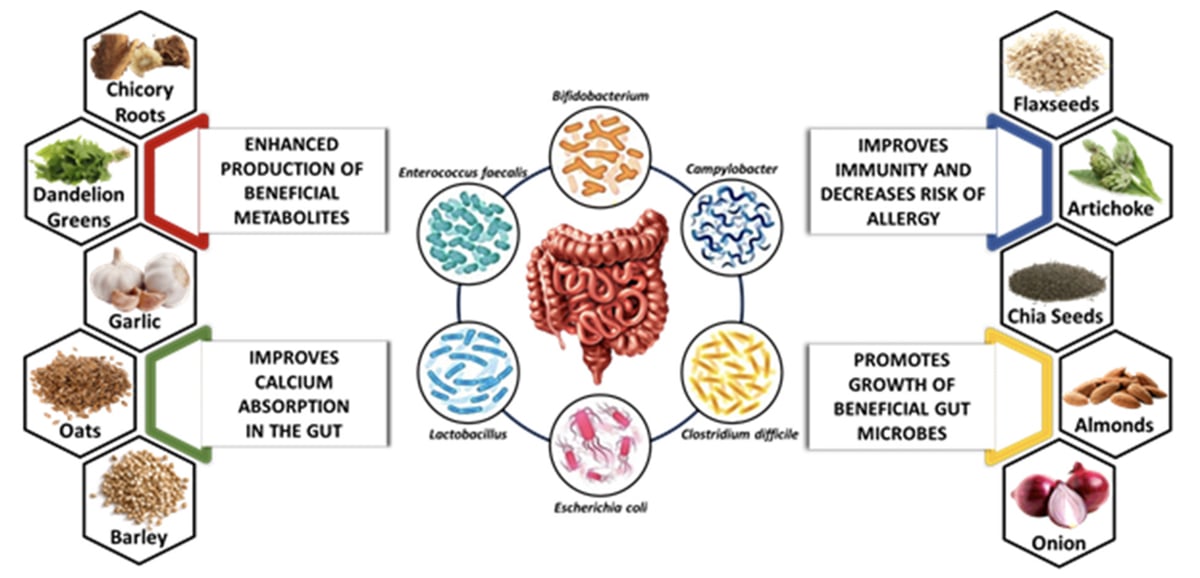
Prebiotic fiber not only feeds the vital probiotics in your gut, but it also helps keep your digestive tract clean so those probiotics can thrive.
Prebiotic fiber can be broken up into two major categories, which play different roles in the cleaning process — insoluble fiber and soluble fiber. A lot of people think that only soluble fiber is prebiotic, but that’s actually not true. Both soluble and insoluble fiber can be considered prebiotics as long as they provide substrate for bacteria and yeast to ferment.
Insoluble Fiber
Insoluble prebiotic fiber is like the tough broom that clears junk and debris from your digestive tract.
Food sources of insoluble fiber include:
Soluble Fiber
Soluble prebiotic fiber plays the role of mopping up trouble spots bacteria may have left behind. Some of the top sources include:
- Okra
- Aloe vera juice
- Beans
- Avocados
- Potatoes
- Stone fruit (nectarines, peaches, cherries)
- Pears
- Sunfiber, aka partially hydrolyzed guar gum
- Acacia fiber powder
- Psyllium fiber
There can also be overlap in many of these foods, with some of them containing a balanced amount of both broom (insoluble fiber) and mop-like (soluble fiber) capabilities.
Should You Take a Prebiotic Supplement?

While probiotic supplements are turning out to be less useful than we had once hoped, we’re finding that certain prebiotic foods and supplements seem designed to nurture your existing beneficial bacteria and create an environment for new, healthy, and diverse gut microbes to thrive.
Here are some of the potential benefits of some of the most potent, food-derived prebiotic supplements:
Sunfiber (partially hydrolyzed guar gum — PHGG)
Sunfiber (also known as PHGG) is a unique low-FODMAP (Fermentable Oligosaccharides, Disaccharides, Monosaccharides, and Polyols), less fermentable, gluten-free, and soluble prebiotic fiber made from guar beans.
The prebiotic fiber in PHGG appears to simultaneously feed healthy gut bugs while also binding to those that may produce uncomfortable or foul-smelling gas. Studies have shown that PHGG may be helpful in cases of small intestinal bacterial overgrowth (SIBO), irritable bowel syndrome (IBS), inflammatory bowel disease (IBD), histamine intolerance, and more.
Polyphenols (like those found in ginger)
The polyphenol antioxidants and other compounds in ginger appear to support microbiome diversity, have an anti-inflammatory effect, and have anti-ulcer properties.
Ginger has been shown to help with nausea and upper gastrointestinal motility(aka the movement of food through the digestive system) when studied in both IBS populations and pregnant women.
Horse Chestnut
A new prebiotic for many, this herbal remedy has been used for many years in populations around the world. Horse chestnut appears to be helpful in reducing inflammation as well as balancing inflammation-causing gut microbes and inflammation-reducing gut bugs. It also may support motility by decreasing gas produced in the small and large intestines, which reduces bloating, constipation, and straining.
Gum Arabic
Gum arabic or acacia gum is a soluble dietary fiber obtained from the stems and branches of the Acacia senegal and Acacia seyal plants, which grow mainly in Africa. This prebiotic fiber has shown many possible benefits to the gut microbiome, including being linked with an increase in beneficial bifidobacteria and a reduction in inflammatory clostridia bacteria in the colon. A recent study also provided evidence of acacia’s benefits elsewhere in the body, with supplementation leading to a significant improvement in blood pressure, blood glucose, and satiety.
Side Effects of Prebiotics: What You Need to Know
Some people who start taking prebiotic supplements experience discomfort. As integrative gut health dietitians specializing in a host of gastrointestinal (GI) disorders, we see this frequently.
However, despite the possibility of discomfort, GI side effects may actually be showing you they are, in fact, working — your gut just needs a little extra love.
The negative symptoms these foods can elicit are not necessarily from the actual foods but from the lack of efficient movement (aka motility) or gut bug diversity in the microbiome of the person eating them.
Many of the foods and prebiotic supplement extracts we listed are high in fermentable carbohydrates (sugars, starches, and fiber), also known as FODMAPs.
Think of your tolerance to these foods as a test to see how robust your microbiome really is. And you can feel confident that — with the right nurturance — over time, your microbiome can improve and become more tolerant of these wonderful prebiotics.
Let’s Not Forget About Postbiotics
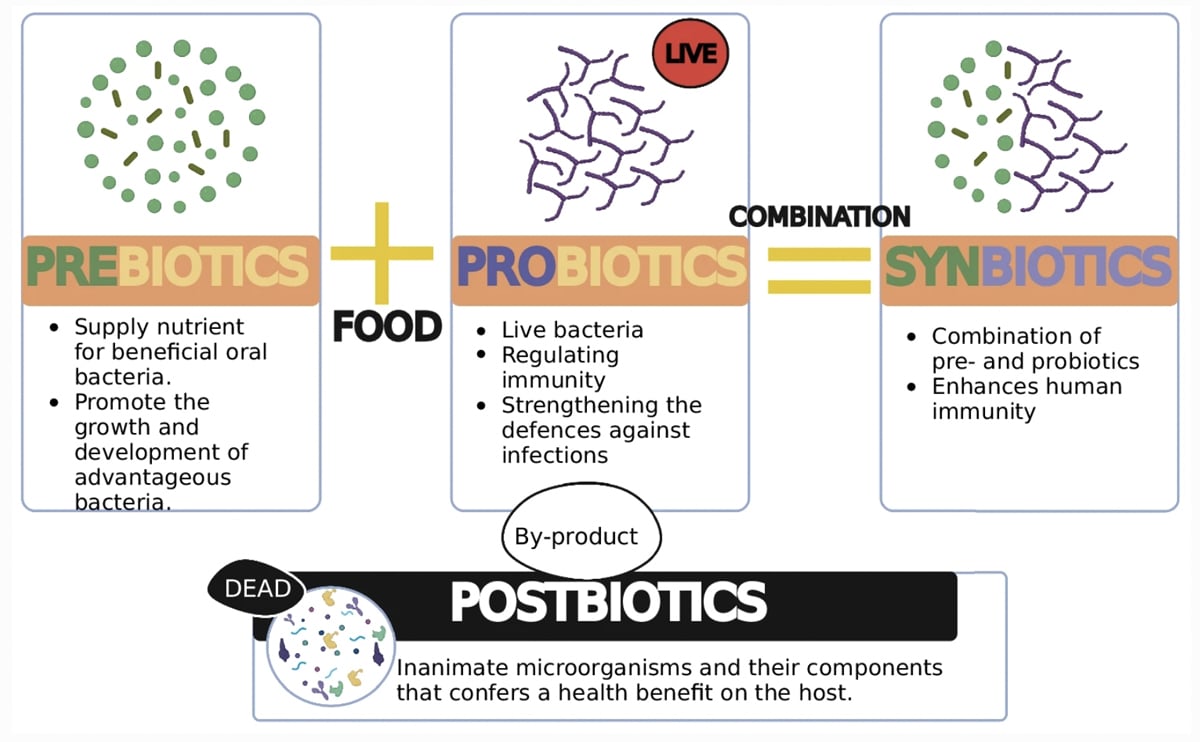
If prebiotics are what feed healthy gut microbes, postbiotics are the bioactive compounds these microbes leave behind. They can pass significant benefits to the host (which in this case, is you!).
Examples of postbiotics include:
- Functional proteins
- Secreted polysaccharides (aka carbohydrate chains)
- Short-chain fatty acids (e.g., acetate, butyrate, propionate)
These byproducts can help with a wide range of functions in the body, including:
- Regulating the immune system
- Reducing tumor formation and growth
- Reducing blood sugar
- Reducing cholesterol and risk for cardiovascular disease
- Repairing the lining of the intestines, reducing intestinal hyperpermeability (aka leaky gut), and instances of or flares of inflammatory bowel disease
- Synthesizing vitamins, including vitamin K
- Increasing nutrient absorption
- Producing about 7–20% of our body’s daily energy
Putting it all Together
If you’re working with digestive health challenges, you may benefit from working with a knowledgeable health care team — including a primary care provider, gastroenterologist, and/or a registered dietitian nutritionist — to help you resolve your specific health challenges. However, there’s a lot that most of us can do on our own that will lead to significant health benefits.
Here are a few final thoughts and tips for creating a thriving gut microbiome:
- Prebiotics are food for the microbes that live in and on your body. If those microbes are well-fed and taken care of, they will be very happy. And that will help your mood through the gut-brain axis and make you happy, too.
- At a minimum, aim for the recommended fiber intake from whole plant foods, but including more can bring even greater benefits.
- Aim for a fiber-rich diet from a diverse array of foods. Shooting for 30 or more unique plants per week can be a great goal.
- When adding more fiber and plant foods, following the low-and-slow rule is a great way to ease your gut microbiome into dietary changes. Rome wasn’t built in a day, and your best gut health won’t be either.
- If you’re currently suffering from a GI condition or experiencing chronic GI symptoms, it can be very helpful to work with a knowledgeable and compassionate care team who can help you understand the many nuances of repairing gut tissue and facilitating new microbes to help improve overall health.
Editor’s Note: A Prebiotic and Postbiotic Source for a Thriving Gut
James and Dahlia Marin, RDN, the authors of this article, partnered with Complement to create a gut health supplement unlike anything else available on the market. They created a solution built around prebiotics to support and build a balanced microbiome (including sunfiber, horse chestnut, and gum arabic), and postbiotics to support long-term health benefits. It’s called Gut Nurture, and it contains a science-backed blend of prebiotics and postbiotics enhanced with antioxidants, pre-fermented vitamins, and gingerroot to support digestion, nutrient absorption, energy, and immune health. Plus, like all Complement products, it’s 100% vegan, made in the USA, triple-tested for purity and potency, and comes in a biodegradable pouch. Click here to find out all about Complement’s Gut Nurture solution. And if you make a purchase using this link, Complement will make a contribution in support of FRN’s work to change the way the world eats (thank you!).
Tell us in the comments:
- Were you aware of the importance of gut health and how it plays such a major role in your long-term health and well-being?
- Have you considered the importance of prebiotic fibers to feed the probiotics in your gut?
- Do you currently take a gut health supplement, and if so, have you noticed a difference?
Featured Image: iStock.com/BRO Vector




